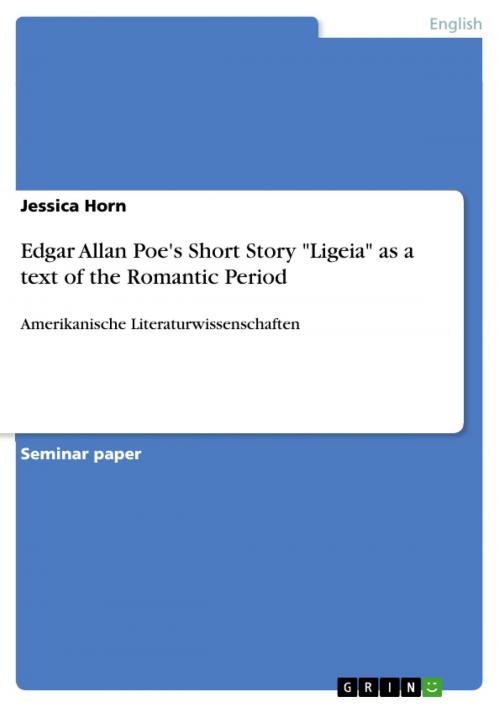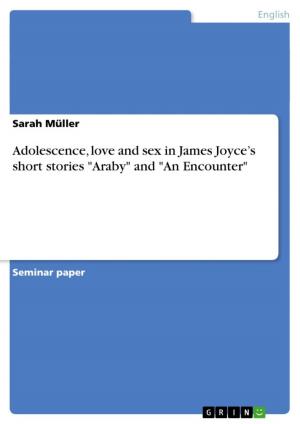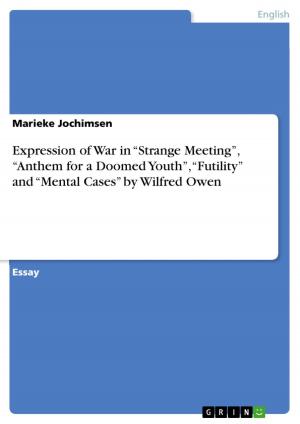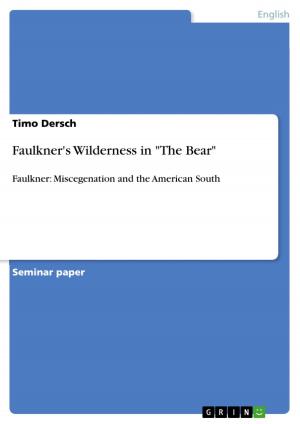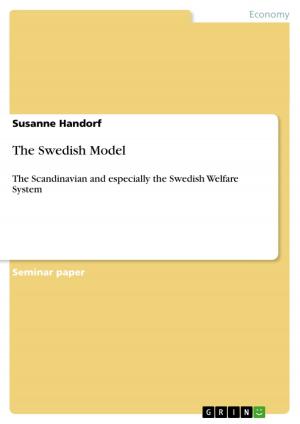Edgar Allan Poe's Short Story 'Ligeia' as a text of the Romantic Period
Amerikanische Literaturwissenschaften
Nonfiction, Entertainment, Drama, Anthologies| Author: | Jessica Horn | ISBN: | 9783640322664 |
| Publisher: | GRIN Publishing | Publication: | April 27, 2009 |
| Imprint: | GRIN Publishing | Language: | English |
| Author: | Jessica Horn |
| ISBN: | 9783640322664 |
| Publisher: | GRIN Publishing |
| Publication: | April 27, 2009 |
| Imprint: | GRIN Publishing |
| Language: | English |
Seminar paper from the year 2004 in the subject American Studies - Literature, grade: 2,0, , course: 'The American Short Story', language: English, abstract: On these pages the elements of the Romantic Period in Edgar Allan Poe's short story 'Ligeia' should be analysed. Poe, 'who has so drastically altered the landscape of the popular imagination' (Wright 375) and who 'had such a powerful effect on his fellow artists' (Wright 375), created with 'Ligeia' a typical text of the Romantic Period. The text 'Ligeia' is about the death of the young lady Ligeia. After her death her husband becomes addicted to opium. Although he spends most of his time thinking of Ligeia, he soon gets married with the lady Rowena Trevanion. After their marriage he brings Rowena into a bridal chamber. This chamber is full of funeral decorations, what attacks Rowena with horror. Because of that she gets ill and feels the presence of the dead Ligeia in the room. Finally Rowena dies and the narrator ends the story with Ligeia's transformation into Rowena's body. After this transformation the reader has to ask himself if Ligeia actually existed, if the whole story is true or if it only takes place in the imagination of the narrator. To illustrate 'Ligeia' as a romantic text I will give a short overview of the history and the elements of the Romantic Period. Afterwards I will explain these elements in Poe's text 'Ligeia' according to keywords like Gothic, Imagination, and the function of the narrator, which are usual for romanticism. Finally I will tell something about Poe's theory concerning the short story to show on the one hand the importance of the self as a major theme of romanticism and on the other hand why Poe helped to establish the genre of science fiction, horror, and fantasy in his modern form.
Seminar paper from the year 2004 in the subject American Studies - Literature, grade: 2,0, , course: 'The American Short Story', language: English, abstract: On these pages the elements of the Romantic Period in Edgar Allan Poe's short story 'Ligeia' should be analysed. Poe, 'who has so drastically altered the landscape of the popular imagination' (Wright 375) and who 'had such a powerful effect on his fellow artists' (Wright 375), created with 'Ligeia' a typical text of the Romantic Period. The text 'Ligeia' is about the death of the young lady Ligeia. After her death her husband becomes addicted to opium. Although he spends most of his time thinking of Ligeia, he soon gets married with the lady Rowena Trevanion. After their marriage he brings Rowena into a bridal chamber. This chamber is full of funeral decorations, what attacks Rowena with horror. Because of that she gets ill and feels the presence of the dead Ligeia in the room. Finally Rowena dies and the narrator ends the story with Ligeia's transformation into Rowena's body. After this transformation the reader has to ask himself if Ligeia actually existed, if the whole story is true or if it only takes place in the imagination of the narrator. To illustrate 'Ligeia' as a romantic text I will give a short overview of the history and the elements of the Romantic Period. Afterwards I will explain these elements in Poe's text 'Ligeia' according to keywords like Gothic, Imagination, and the function of the narrator, which are usual for romanticism. Finally I will tell something about Poe's theory concerning the short story to show on the one hand the importance of the self as a major theme of romanticism and on the other hand why Poe helped to establish the genre of science fiction, horror, and fantasy in his modern form.
